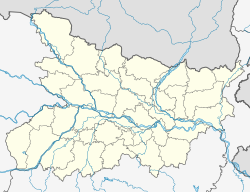Dharhara, Bhagalpur
Dharhara | |
|---|---|
village | |
 Dharhara | |
| Coordinates: 25°21′49.6″N 87°08′07.3″E / 25.363778°N 87.135361°ECoordinates: 25°21′49.6″N 87°08′07.3″E / 25.363778°N 87.135361°E | |
| Country | India |
| State | Bihar |
| District | Bhagalpur |
| Block | Gopalpur |
| Population (2001) | |
| • Total | 3,317 |
| Time zone | UTC+5:30 (IST) |
| Area code(s) | 06344 |
| ISO 3166 code | IN-BR |
Dharhara is a village in the Bhagalpur district of Bihar, India. There is a tradition of plantation when a girl is born in any family of this village. The occupation of this village is farming.
Geography[]
Dharhara is located at 25°21'49.6"N 87°08'07.3"E. Most of the villagers are farmers by profession. It is contiguous with Gosain Village to its East, GopalPur to its South, panchgachia to its North and Naugachhia Block to its West. Its assembly constituency is Gopalpur assembly constituency and Lok Sabha Constituency is Bhagalpur parliamentary constituency. Its nearest small city is Naugachia and bigger city is Bhagalpur. Most villagers speaks in Angika, Hindi, and Urdu language.
Tree plantations[]
The village came into the limelight in 2010, when it was reported that the families plant a minimum of 10 trees whenever a girl child is born. The tree-planting had been going on for generations. By 2010, the village with a population of 7,000, had over 100,000 trees, mostly mango and lychee.[1] In India, female infanticide and dowry deaths have been a big for challenge the authorities; therefore, this initiative of Dharhara's residents was hailed by the Bihar's chief minister, Nitish Kumar.[2] In 2010, the village was also in the news for illegal banks floated by criminals.[3]
References[]
- ^ Amarnath Tewary (15 June 2010). "How fruit trees in Indian village save girls' lives". BBC News. Retrieved 16 June 2010.
- ^ "Nitish Kumar hails Dharhara natives for planting trees". DNA. 6 June 2010. Retrieved 16 June 2010.
- ^ Bihar's Goonda Banks: ‘Cough Up Interest Or Die’ Archived 5 September 2012 at the Wayback Machine. Tehelka. 11 October 2010.
- Villages in Bhagalpur district

